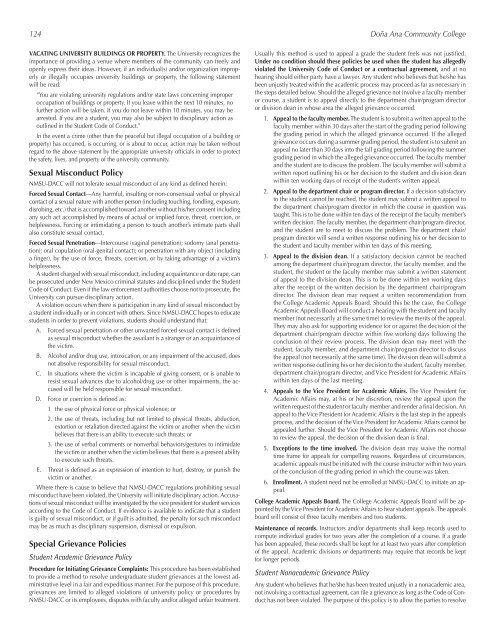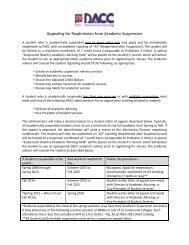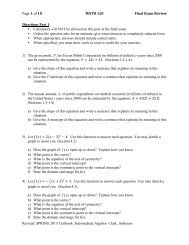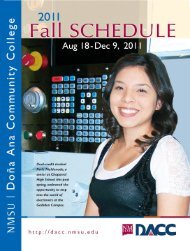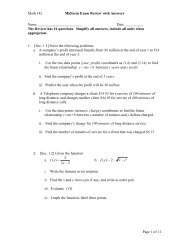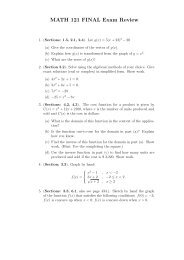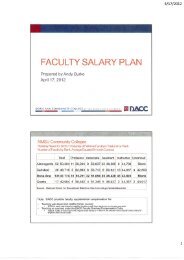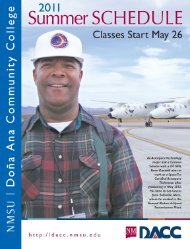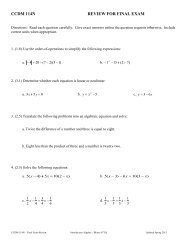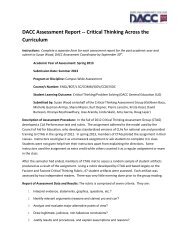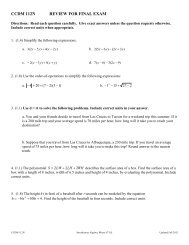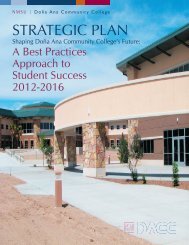DACC Catalog - Dona Ana Community College - New Mexico State ...
DACC Catalog - Dona Ana Community College - New Mexico State ...
DACC Catalog - Dona Ana Community College - New Mexico State ...
Create successful ePaper yourself
Turn your PDF publications into a flip-book with our unique Google optimized e-Paper software.
124 Doña <strong>Ana</strong> <strong>Community</strong> <strong>College</strong>Vacating University Buildings or Property. The University recognizes theimportance of providing a venue where members of the community can freely andopenly express their ideas. However, if an individual(s) and/or organization improperlyor illegally occupies university buildings or property, the following statementwill be read:“You are violating university regulations and/or state laws concerning improperoccupation of buildings or property. If you leave within the next 10 minutes, nofurther action will be taken. If you do not leave within 10 minutes, you may bearrested. If you are a student, you may also be subject to disciplinary action asoutlined in the Student Code of Conduct.”In the event a crime (other than the peaceful but illegal occupation of a building orproperty) has occurred, is occurring, or is about to occur, action may be taken withoutregard to the above statement by the appropriate university officials in order to protectthe safety, lives, and property of the university community.Sexual Misconduct PolicyNMSU-<strong>DACC</strong> will not tolerate sexual misconduct of any kind as defined herein:Forced Sexual Contact—Any harmful, insulting or non-consensual verbal or physicalcontact of a sexual nature with another person (including touching, fondling, exposure,disrobing, etc.) that is accomplished toward another without his/her consent includingany such act accomplished by means of actual or implied force, threat, coercion, orhelplessness. Forcing or intimidating a person to touch another’s intimate parts shallalso constitute sexual contact.Forced Sexual Penetration—Intercourse (vaginal penetration); sodomy (anal penetration);oral copulation (oral-genital contact); or penetration with any object (includinga finger), by the use of force, threats, coercion, or by taking advantage of a victim’shelplessness.A student charged with sexual misconduct, including acquaintance or date rape, canbe prosecuted under <strong>New</strong> <strong>Mexico</strong> criminal statutes and disciplined under the StudentCode of Conduct. Even if the law enforcement authorities choose not to prosecute, theUniversity can pursue disciplinary action.A violation occurs when there is participation in any kind of sexual misconduct bya student individually or in concert with others. Since NMSU-<strong>DACC</strong> hopes to educatestudents in order to prevent violations, students should understand that:A. Forced sexual penetration or other unwanted forced sexual contact is definedas sexual misconduct whether the assailant is a stranger or an acquaintance ofthe victim.B. Alcohol and/or drug use, intoxication, or any impairment of the accused, doesnot absolve responsibility for sexual misconduct.C. In situations where the victim is incapable of giving consent, or is unable toresist sexual advances due to alcohol/drug use or other impairments, the accusedwill be held responsible for sexual misconduct.D. Force or coercion is defined as:1 the use of physical force or physical violence; or2. the use of threats, including but not limited to physical threats, abduction,extortion or retaliation directed against the victim or another when the victimbelieves that there is an ability to execute such threats; or3. the use of verbal comments or nonverbal behaviors/gestures to intimidatethe victim or another when the victim believes that there is a present abilityto execute such threats.E. Threat is defined as an expression of intention to hurt, destroy, or punish thevictim or another.Where there is cause to believe that NMSU-<strong>DACC</strong> regulations prohibiting sexualmisconduct have been violated, the University will initiate disciplinary action. Accusationsof sexual misconduct will be investigated by the vice president for student servicesaccording to the Code of Conduct. If evidence is available to indicate that a studentis guilty of sexual misconduct, or if guilt is admitted, the penalty for such misconductmay be as much as disciplinary suspension, dismissal or expulsion.Special Grievance PoliciesStudent Academic Grievance PolicyProcedure for Initiating Grievance Complaints: This procedure has been establishedto provide a method to resolve undergraduate student grievances at the lowest administrativelevel in a fair and expeditious manner. For the purpose of this procedure,grievances are limited to alleged violations of university policy or procedures byNMSU-<strong>DACC</strong> or its employees, disputes with faculty and/or alleged unfair treatment.Usually this method is used to appeal a grade the student feels was not justified.Under no condition should these policies be used when the student has allegedlyviolated the University Code of Conduct or a contractual agreement, and at nohearing should either party have a lawyer. Any student who believes that he/she hasbeen unjustly treated within the academic process may proceed as far as necessary inthe steps detailed below. Should the alleged grievance not involve a faculty memberor course, a student is to appeal directly to the department chair/program directoror division dean in whose area the alleged grievance occurred.1. Appeal to the faculty member. The student is to submit a written appeal to thefaculty member within 30 days after the start of the grading period followingthe grading period in which the alleged grievance occurred. If the allegedgrievance occurs during a summer grading period, the student is to submit anappeal no later than 30 days into the fall grading period following the summergrading period in which the alleged grievance occurred. The faculty memberand the student are to discuss the problem. The faculty member will submit awritten report outlining his or her decision to the student and division deanwithin ten working days of receipt of the student’s written appeal.2. Appeal to the department chair or program director. If a decision satisfactoryto the student cannot be reached, the student may submit a written appeal tothe department chair/program director in which the course in question wastaught. This is to be done within ten days of the receipt of the faculty member’swritten decision. The faculty member, the department chair/program director,and the student are to meet to discuss the problem. The department chair/program director will send a written response outlining his or her decision tothe student and faculty member within ten days of this meeting.3. Appeal to the division dean. If a satisfactory decision cannot be reachedamong the department chair/program director, the faculty member, and thestudent, the student or the faculty member may submit a written statementof appeal to the division dean. This is to be done within ten working daysafter the receipt of the written decision by the department chair/programdirector. The division dean may request a written recommendation fromthe <strong>College</strong> Academic Appeals Board. Should this be the case, the <strong>College</strong>Academic Appeals Board will conduct a hearing with the student and facultymember (not necessarily at the same time) to review the merits of the appeal.They may also ask for supporting evidence for or against the decision of thedepartment chair/program director within five working days following theconclusion of their review process. The division dean may meet with thestudent, faculty member, and department chair/program director to discussthe appeal (not necessarily at the same time). The division dean will submit awritten response outlining his or her decision to the student, faculty member,department chair/program director, and Vice President for Academic Affairswithin ten days of the last meeting.4. Appeals to the Vice President for Academic Affairs. The Vice President forAcademic Affairs may, at his or her discretion, review the appeal upon thewritten request of the student or faculty member and render a final decision. <strong>Ana</strong>ppeal to the Vice President for Academic Affairs is the last step in the appealsprocess, and the decision of the Vice President for Academic Affairs cannot beappealed further. Should the Vice President for Academic Affairs not chooseto review the appeal, the decision of the division dean is final.5. Exceptions to the time involved. The division dean may waive the normaltime frame for appeals for compelling reasons. Regardless of circumstances,academic appeals must be initiated with the course instructor within two yearsof the conclusion of the grading period in which the course was taken.6. Enrollment. A student need not be enrolled at NMSU-<strong>DACC</strong> to initiate an appeal.<strong>College</strong> Academic Appeals Board. The <strong>College</strong> Academic Appeals Board will be appointedby the Vice President for Academic Affairs to hear student appeals. The appealsboard will consist of three faculty members and two students.Maintenance of records. Instructors and/or departments shall keep records used tocompute individual grades for two years after the completion of a course. If a gradehas been appealed, these records shall be kept for at least two years after completionof the appeal. Academic divisions or departments may require that records be keptfor longer periods.Student Nonacademic Grievance PolicyAny student who believes that he/she has been treated unjustly in a nonacademic area,not involving a contractual agreement, can file a grievance as long as the Code of Conducthas not been violated. The purpose of this policy is to allow the parties to resolve


